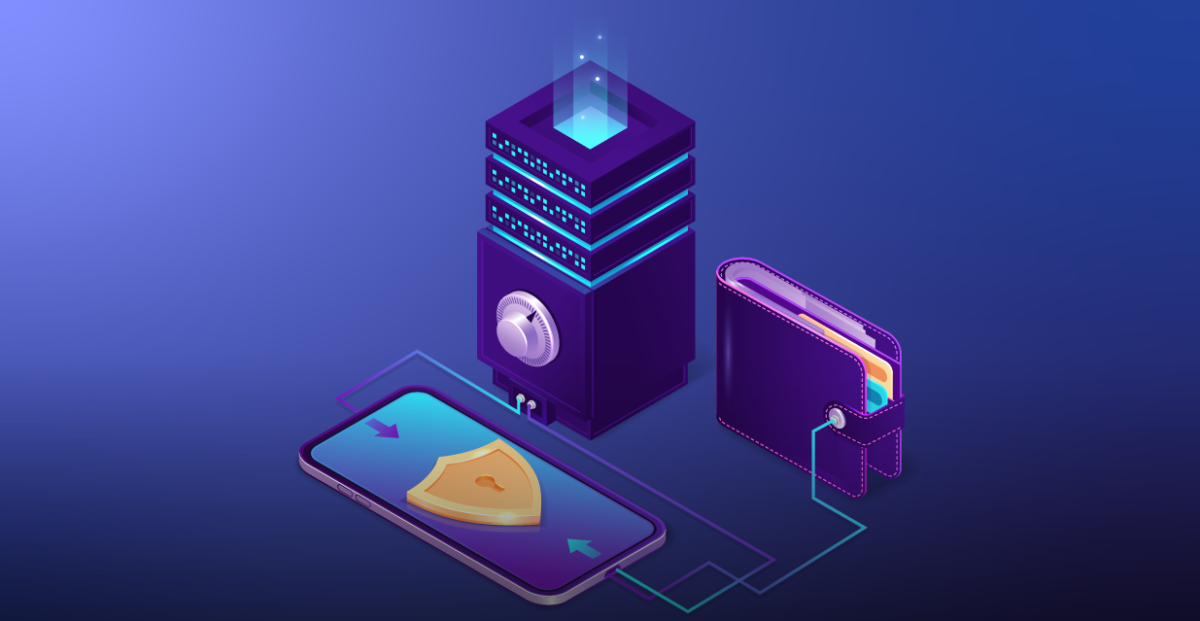The cryptocurrency sector has expanded significantly in recent years. Crypto traders are generating large returns on their investments, and it appears that this trend will continue for a long time.
Because the future of crypto trading appears promising, now is the time to invest in establishing a crypto wallet for a large consumer base.
What Is A Crypto Wallet?
A cryptocurrency wallet, like any other digital wallet, allows users to store, send, and receive cryptocurrency.
It is a piece of software that securely saves cryptocurrencies and keeps track of their transaction records (buying, selling, and lending). Users can quickly download and install a cryptocurrency wallet on their smartphone or any other device that supports it. Kryptomind specializes in developing the best crypto wallets out there.
Here’s How Cryptocurrency Wallets Work:
To transact with cryptocurrency, you’ll need two things: your wallet address, also known as your public key, and your private key.
A public key:
It is analogous to your bank account number. You can transfer or receive money by sharing your bank account number with other people. Similarly, to receive the cryptocurrency, you can disclose your public key, which is your wallet’s address.
A private key:
A private key in your crypto wallet is comparable to your bank account password or the PIN on your debit card, both of which are private. You wouldn’t want to give out your PIN to just anyone because it would allow them immediate access to your bank account. A private key is a password that allows you to access your cryptocurrency.
When you want to acquire cryptocurrency, whether through purchase or as a gift, you direct your crypto sender to a unique cryptographic address issued by your wallet.
So, the cryptocurrency wallet does not directly keep your crypto coins; – they remain on the blockchain. Because cryptocurrency does not exist in any physical form, the crypto wallet stores information about your public and private keys, which represent your ownership share in the cryptocurrency. You can transmit and receive cryptocurrency using both of these keys while keeping your private key entirely encrypted.
Various Types Of Crypto Wallets
Depending on what users intend to do with cryptocurrency, there are a variety of crypto wallet alternatives available on the market.
The two main types are cold and hot crypto wallets, depending on whether or not the wallet can be connected to the Internet.
Hot Wallet:
Hot wallets must be connected to the internet to function, and as a result, they are less secure.
Pros:
These are easily accessible.
These wallets are more user-friendly.
Cons:
These wallets are more subject to security concerns and fraudulent attacks as they are connected to the internet all the time.
Privacy is often compromised.
Cold Wallet:
These are safer bets than other wallets because they function like vaults for daily transactions.
Cons:
The interface is not very user-friendly.
There are various sorts of wallets, some of which are internet-connected while others are not.
Pros:
These wallets store cryptocurrency offline and provide increased security.
A hot wallet can easily be accessed by downloading a software program to your computer desktop or a smartphone app. Take a look at several types of hot wallets:
1. Desktop Wallets
Desktop wallets are designed to be used on a desktop or laptop computer. They are accessible from the computer where they were initially installed.
Our developed Desktop wallets include the HOGI wallet, G-wallet, and DASH Wallet
2. Mobile Wallets
Mobile wallets have the same functionalities as desktop wallets. However, by scanning QR codes with touch-to-pay and NFC, they make it simple to process purchases in real stores.
Mobile wallets include HOGI wallet, G-wallet, DASH Wallet, and Hive Android.
3. Web Wallets
Web wallets allow for easy access to cryptocurrency from any browser or mobile device. They operate in the cloud. Because private keys are stored online, they are extremely convenient to use.
What Is The Best Way To Create A Cryptocurrency Wallet?
With the appropriate strategy in place, you can create a popular bitcoin wallet software. We have developed many crypto wallets that are currently popular in the market.
Let’s have a look at how to go about it and create a crypto wallet.
1. Be familiar with Blockchain and Cryptocurrencies
Blockchain technology is critical in the creation of crypto apps.
If you want to create a crypto wallet application, you should first learn about blockchain and cryptocurrencies.
As the name implies, a blockchain is a chain of blocks containing digital information (data), and the chain is the cryptographic principle that connects the data blocks. The entire goal of employing it is to allow for the secure sharing of valuable data.
2. Make Use of Common Cryptocurrency Libraries That are Open-Source
The majority of cryptocurrencies are open source. As a result, you do not require to work from scratch. You can use pre-existing free libraries, such as the BitcoinJ SDK or Coinbase SDK.
The Coinbase SDK is a Java library that runs on multiple platforms. It assists developers in creating cryptocurrency wallets for both the iOS and Android platforms.
The BitcoinJ SDK comes with extensive documentation. Furthermore, BitcoinJ is JVM-compatible and supports languages such as C++, JavaScript, Ruby, and Python, among others.
3. Make use of APIs
APIs are an excellent method to create a feature-rich cryptocurrency wallet application. When you use a distributed ledger API, you may quickly synchronize your cryptocurrency wallet with the blockchain ecosystem.
Using APIs, your development team may complete the essential stages in a relatively short time, increasing the speed of app development.
4. Use the Cloud
To construct a crypto wallet app, you must first find a BaaS (Blockchain as a Service) provider and incorporate their cloud service into your app. Azure, Amazon, and Microsoft provide BaaS offerings.
Depending on your needs and desires, you may use one of them to create a secure bitcoin wallet software.
5. Select the Appropriate Technology Stack
If you want to create a web app, you can utilize Node.js or Angular.js in conjunction with HTML5 and CSS3. This will assist you in developing a scalable crypto web application.
When creating a native Android app, you have the option of using different languages within Java.
6. Emphasize Security
When developing cryptocurrency wallet software, security is of the utmost importance. So, you must ensure that your wallet is highly secure.
With 2FA, you may add additional security layers to the crypto wallet software, such as fingerprints, face ID, and hardware authentication. The developers must regularly check security and must find flaws (if any) and other security issues as soon as possible and fix them by utilizing cutting-edge technologies.
7. Examine Your Competitors
It goes without saying that you want your cryptocurrency wallet app to stand out from the crowd. For that reason, it’s critical to keep an eye on your competitors. Know what they’re currently doing in the market and what technology they’ve used. You can look over the features to see what unique features you can incorporate into your app.
Remember, if you want to get a competitive advantage over others, you must be aware of what is going on around you.
8. Begin Working on Your App
So, when you’re ready to begin developing a crypto wallet, make sure you complete the necessary steps.
The Most Important Features to Include in Your Crypto Wallet App
Your cryptocurrency wallet software must provide improved functionality in addition to meeting your business logic needs.
Here are the essential features that any crypto wallet app must-have.
1. User Authorization
Wallet apps are exposed to a range of security vulnerabilities due to the popularity and relevance of cryptocurrencies. As a result, it’s always a good idea to add two-factor or multi-factor authentication to your crypto wallet app’s user authentication (2FA or MFA). The 2FA or MFA adds an extra layer of security that many non-crypto apps do not provide.
2. Scanner for QR Codes
A QR Code Scanner function accelerates, simplifies, and secures your cryptocurrency wallet software transactions.
With a QR code scanner, you can automate the scanning of wallet addresses and public keys. As a result, with a single click, it improves cryptocurrency transfers.
Rather than typing all of the lengthy characters of public keys one by one, the app user can scan the QR code, and the information is retrieved via the scanner. It is a safe and secure method of conducting cryptocurrency transactions.
3. Numerous Cryptocurrencies
Your wallet must support multiple cryptocurrencies.
This is since numerous new currencies are added regularly, and their values fluctuate. You wouldn’t want to keep many extra wallets to store your cryptos. Would you?
Therefore, your wallet must enable you to transact in many currencies at the same time.
4. Paper Wallet Import
Your app must allow users to send and receive crypto money by scanning a paper wallet with a QR code.
5. Push Notifications
Push notifications are a vital feature that allows your users to be alerted and notified of crypto transactions at all times. With this function, users of your cryptocurrency application will be notified about the price of their digital currency, the success or failure of any transactions, and so on.
This functionality ensures that notifications for all transactions on your account are sent in real-time.
6. Current Conversion Rates
No cryptocurrency wallet app is complete without the calculation of transaction fees based on constantly changing conversion rates.
This is because the crypto wallet app allows its users to transfer money between several modalities, such as the same digital currency, alternative digital currencies, or both digital and fiat currencies. This will surely necessitate that they are kept up to speed on the current currency value in real-time.
7. Blockchain-Based Transactions
Blockchain technology for the development of your crypto app should be amazing. Your users will be able to transmit and receive digital currency using your crypto application in a completely tamper-proof and speedy manner as a result of it.
They can also examine their available balance as well as their whole transaction history. This is because all completed transactions are sent to the blockchain network.
8. Managing Familiar Addresses
This feature intends to make the entire transaction process much easier, faster, and more convenient by offering your users a mode to manage all frequently-used addresses.
9. Payment Gateways
A payment gateway incorporated into your app can let users buy and trade digital goods more efficiently.
10. Optional Session Logout
This is a fantastic feature for your app’s security measures. With this in place, if your users are inactive for an extended time, they will be automatically logged out and will need to re-login to utilize the app.
With Kryptomind, you can create a powerful cryptocurrency wallet app
A wallet is necessary for all cryptocurrency transactions. It will allow users to store, give, swap, and trade various digital currencies such as Bitcoin, Ripple, Ether, and others. Contact us if you want to create a cryptocurrency wallet app.
We are a leading blockchain development company with extensive experience in the development of wallet applications.


